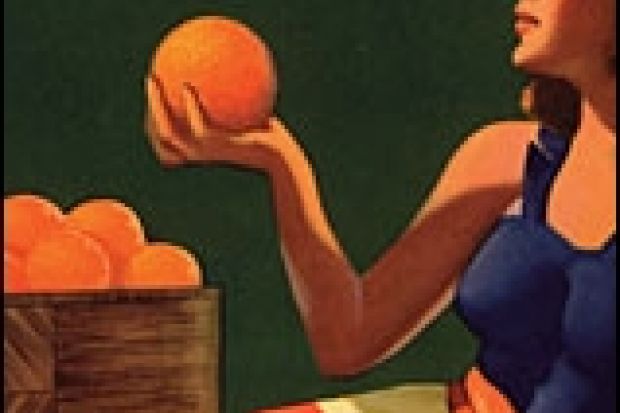Food has always been a (in some ways the) central concern of mankind, but of late it has received unprecedented press: from a spate of books on "proper eating" to celebrity chefs moving beyond gastronomical confines to advocating the type of vegetable gardening appropriate for the White House.
In the academic world, although food has long been studied in contexts such as agriculture, medical science and anthropology, "food studies" has recently emerged as a distinct, multidisciplinary area of its own.
Geography is a significant part of this approach: this year's annual meeting of the Association of American Geographers began with a session on "Organic Production, Local Foods and Sustainability", and continued with multiple sessions relating to food. And so it is not altogether surprising that a professor of geography, Susanne Freidberg, should explore the notion of the freshness of food in Fresh: A Perishable History.
It's obviously a positive quality, but how did the virtuous connotations of fresh food come about? What precisely does "freshness" mean? In the process of deliberating these questions, she highlights the changing meaning of freshness, depending on the food and context, and also the far-reaching consequences of the demand for freshness: how the desire for fresh (live) fish has wreaked havoc on wild fish populations, why milk is still very much a local produce, and how impoverished farmers end up growing food too expensive for local consumption.
The historic cycles of food surplus and scarcity have driven innovations in food-preservation technologies, but with the advent of refrigeration, things changed. It wasn't just a way of keeping perishable food edible for longer: the relationship of food availability to locale, season and even nature itself came into question. The very notion of freshness itself was transformed.
Appropriately, Freidberg begins with a whole chapter devoted to refrigeration, complete with its history and the many fascinating characters that made that story. The succeeding chapters each deal with a particular food: beef, eggs, milk, vegetables, fruit and fish, with interesting stories of their own that could fill an entire book.
The theme of freshness plays itself out differently in each case, replete with an engaging cast of characters. French fruit farmers, Argentine cattle ranchers, Mexican dairy farmers hidden from view in pastoral Vermont and Hong Kong seafood aficionados all enter into this lively and edifying account. The book includes a sweeping survey of how ideas of freshness vary culturally, but have invariably been influenced by urbanisation and globalisation - and by technological innovations that preserve the illusion of straight-from-the-source freshness.
Fresh is not so much an expose of the freshness of food or a consumer guide, even for the "green", enlightened consumer. Rather, it deals with the multitude of issues that have made freshness a virtual fetish: marketing, chiefly, but also technological innovations, global trade, economies of scale, local livelihoods, communities, whimsies of tastes. Freidberg offers a thoroughly researched account, with more than 100 pages of references. A few too many direct quotations mildly encumber readability, but overall it is a lively, engaging book.
In presenting a fair-minded and sobering account of the factors involved in and consequences of the economy-of-scale fresh-food supply web, Freidberg notes that "locavore" and organic-food movements address certain problems, but do not offer solutions. Shopping at the local farmers' market, although satisfyingly charming, is a relatively privileged indulgence.
In fact, as the book amply illustrates, strict belief in ideas of what is fresh, natural or eco-friendly often blind well-intentioned consumers to the larger causes of the problems that we imagine we are addressing by shopping and eating "right".
Fresh: A Perishable History
By Susanne Freidberg. Belknap Harvard, 416pp, £20.95. ISBN 9780674032910. Published 22 May 2009
Register to continue
Why register?
- Registration is free and only takes a moment
- Once registered, you can read 3 articles a month
- Sign up for our newsletter
Subscribe
Or subscribe for unlimited access to:
- Unlimited access to news, views, insights & reviews
- Digital editions
- Digital access to THE’s university and college rankings analysis
Already registered or a current subscriber? Login
